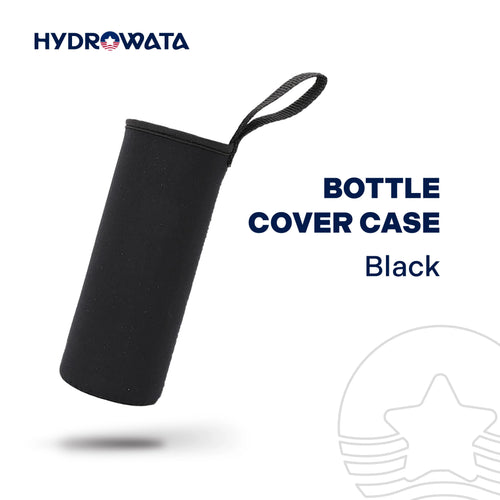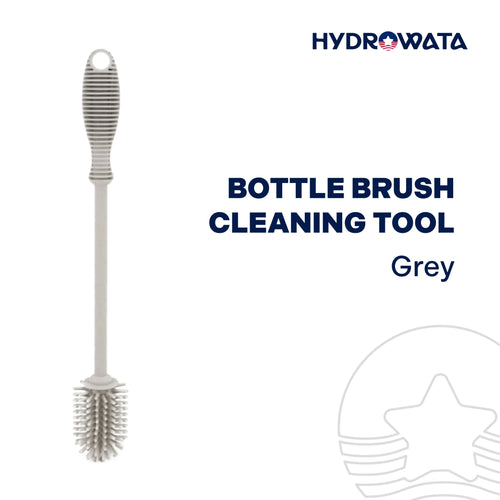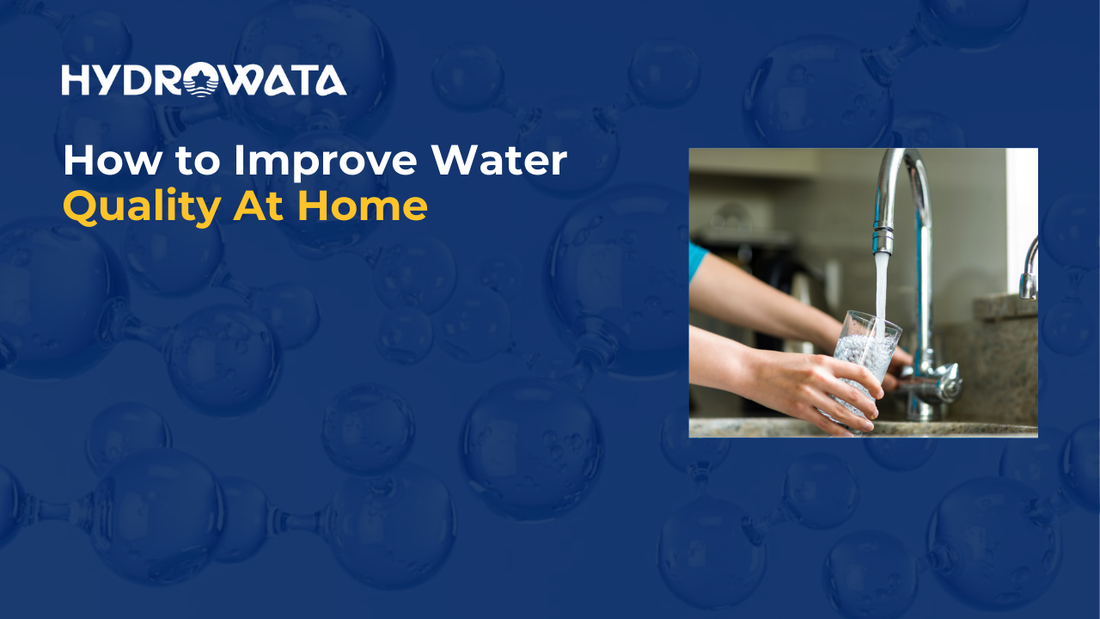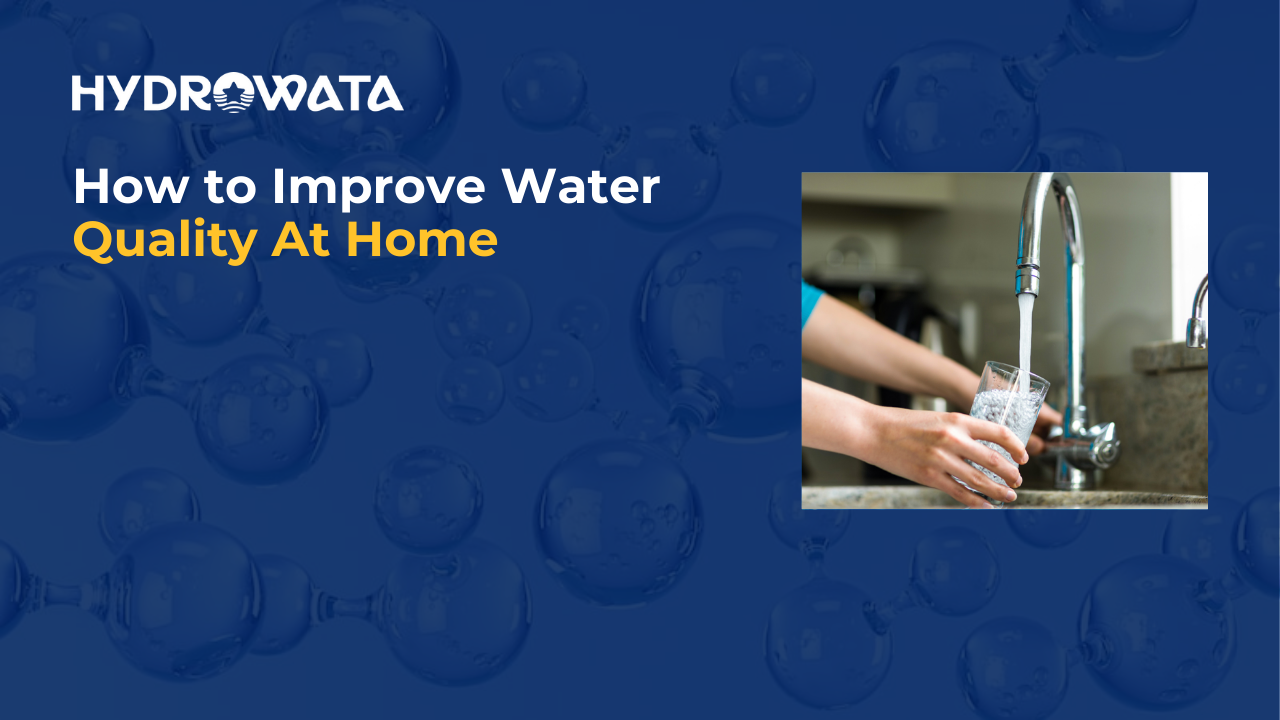Clean, safe water is essential for everyday living—whether it's for drinking, cooking, or bathing. Yet, many homeowners are unaware of the potential contaminants lurking in their tap water, from heavy metals to chlorine and bacteria. Poor water quality can affect your health, damage appliances, and even alter the taste of your food. Fortunately, how to improve water quality at home is a question with many accessible answers. With the right tools and knowledge, you can take simple steps to ensure that the water you and your family use every day is pure, healthy, and refreshing.
Should I Test My Home Water Quality?

Yes, testing your home water quality is an important first step toward ensuring your family's health and safety. Even if your water looks clean and tastes fine, it can still contain harmful contaminants such as lead, pesticides, chlorine, nitrates, or bacteria. These impurities can come from aging pipes, nearby agricultural or industrial activity, or even your municipal water supply.
Learning how to improve water quality at home starts with knowing what you’re dealing with. You can purchase home water test kits from hardware stores or online, or hire a professional for more detailed analysis. These tests typically check for pH levels, hardness, presence of heavy metals, bacteria, and other common pollutants.
If you're on a private well, testing becomes even more critical since well water isn't regulated by the EPA. Annual testing is recommended, especially after natural disasters, construction nearby, or any changes in taste, color, or odor. Understanding how to improve water quality at home through proper testing and treatment empowers you to make informed decisions and take meaningful steps to protect your household.
How to Improve Water Quality at Home

Test Your Water

If you're wondering how to improve water quality at home, the first and most essential step is testing your water. Whether you're on city water or a private well, contaminants can still make their way into your supply.
Use a home water testing kit or hire a certified professional to check for common pollutants such as lead, chlorine, nitrates, bacteria, and hardness levels. Understanding what's in your water allows you to choose the most effective filtration and treatment solutions. Regular testing—at least once a year—is a smart habit for maintaining good water quality.
Install a Water Filtration System
One of the best answers to how to improve water quality at home is installing a reliable water filtration system. These systems can be tailored to your needs.
Activated carbon filters remove chlorine, sediment, and odors; reverse osmosis systems are great for filtering out heavy metals and dissolved solids; and UV filters can eliminate harmful bacteria and viruses. Y
ou can choose between point-of-use filters (like for your kitchen sink) or whole-house systems that treat all the water entering your home.
Flush the Water Line
Overnight or during periods of low usage, water can sit in your plumbing and accumulate bacteria or metals. A simple method for how to improve water quality at home is to flush your water lines in the morning.
Run the tap for about one minute before use, especially if the water has been stagnant. This helps clear out any impurities that may have built up and ensures you're using the freshest water possible.
Get a Water Softener

Hard water is a common issue in many households and can lead to scale buildup in pipes, appliances, and fixtures. If you're serious about how to improve water quality at home, installing a water softener is a game-changer.
Softeners use ion exchange to remove excess calcium and magnesium, resulting in softer water that extends the life of your plumbing, improves soap efficiency, and enhances overall water taste.
Use Cold Water
A simple but effective tip on how to improve water quality at home is to always use cold water for drinking and cooking.
Hot water can dissolve contaminants like lead or sediment from your pipes more easily, which can end up in your glass or pot.
Boil cold water if needed, but never assume hot tap water is safe for direct consumption.
Change Filters Regularly

Even the best filtration systems won’t be effective if you don’t maintain them. Regular filter replacement is a key part of how to improve water quality at home. Follow the manufacturer’s guidelines—this could mean every two to six months for faucet or pitcher filters, and once or twice a year for larger systems. A clogged or old filter can not only stop working but may actually leach contaminants back into your water.
Use a Faucet Aerator
Faucet aerators are small, inexpensive devices that can have a big impact on how to improve water quality at home. They help trap sediment, reduce splashing, and improve water pressure. Some aerators come with built-in screens that filter out small particles. Replacing or cleaning these devices regularly ensures they continue functioning effectively.
Replace Old Faucet
Outdated faucets can be a hidden source of lead or corrosion, especially in older homes. Replacing them with modern, lead-free models is an important step in how to improve water quality at home. Newer faucets also tend to be more efficient and compatible with filtration accessories, helping you maintain cleaner, safer water with less hassle.
Update Old Plumbing Pipes
Your plumbing plays a major role in your home’s water quality. If you're still relying on galvanized steel or lead pipes, consider upgrading to PEX or copper. Over time, old pipes can corrode or leach harmful substances into your water supply. Knowing how to improve water quality at home includes recognizing when it’s time for a plumbing upgrade—especially if your home was built before 1986, when lead-based plumbing was more common.
Drain Your Water Heater

Water heaters can collect sediment over time, especially if you have hard water. This buildup not only affects water quality but also reduces the efficiency and lifespan of your heater. To address this, drain and flush your water heater at least once a year. It’s a simple but often overlooked step in how to improve water quality at home. Clear water inside the tank leads to cleaner water at your tap—and saves you money in the long run.
Improve Your Water By Using HydroWata Hydrogen Water Bottle

The HydroWata Hydrogen Water Bottle is an excellent solution for those seeking enhanced hydration and learning how to improve water quality at home and on the go.
This advanced device infuses your water with molecular hydrogen—known for its powerful antioxidant properties. Hydrogen-rich water may help reduce inflammation, boost energy levels, and support cellular health.
Unlike basic filters, HydroWata adds a health-boosting element to your daily hydration routine. It's portable, rechargeable, and easy to use, making it perfect for home, office, or travel. If you want to take your water quality to the next level while supporting overall wellness, this bottle is a smart, modern choice.
Conclusion
How to improve water quality at home doesn’t have to be complicated or expensive. With regular testing, the right filtration systems, and simple maintenance habits, you can significantly reduce harmful contaminants and enjoy safer, better-tasting water.
Whether you're replacing old pipes or adding a hydrogen water bottle like HydroWata to your routine, every step contributes to healthier living. Clean water is a foundation for overall well-being—make it a priority in your home. By understanding how to improve water quality at home, you're investing in long-term health, comfort, and peace of mind for yourself and your family.
FAQs
1. How often should I test my home water?
At least once a year, or more frequently if you notice changes in taste, color, or odor—especially if you’re using a private well.
2. What’s the best water filter for home use?
It depends on your specific needs. Activated carbon filters are great for taste and odor, while reverse osmosis is ideal for heavy metal removal.
3. Can boiling water remove all contaminants?
Boiling can kill bacteria and viruses but won’t remove heavy metals or chemicals. It’s not a substitute for proper filtration.
4. Is hard water harmful to drink?
While not typically dangerous, hard water can cause scaling and affect taste. It may also dry out skin and damage plumbing over time.
5. What is hydrogen water and is it safe?
Hydrogen water is regular water infused with molecular hydrogen. It’s safe to drink and may offer antioxidant benefits based on emerging research.





